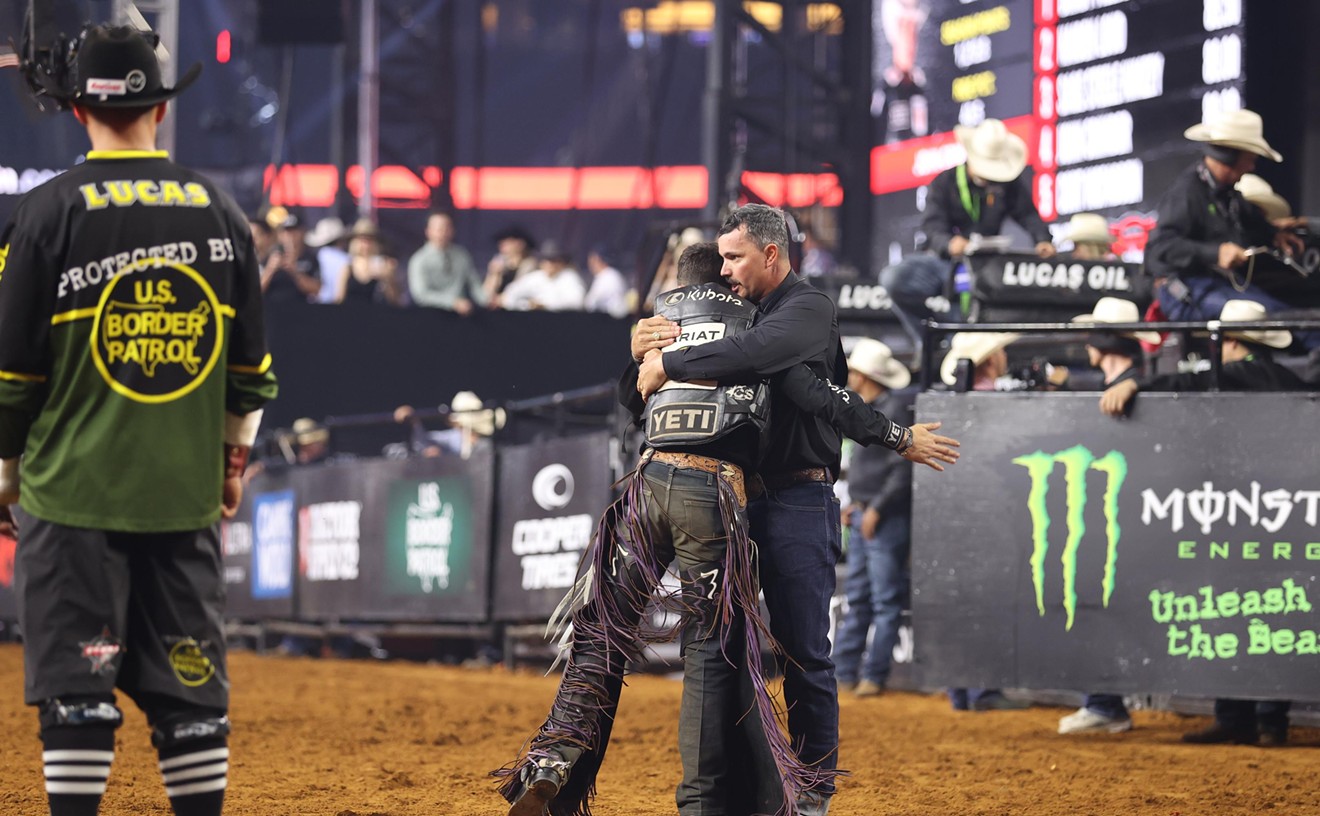On Saturday, Miami's first gay literary festival, Reading Queer, hosted its headlining event at the Miami Beach Botanical Garden, where poet and scholar L. Lamar Wilson read selections from his award-winning collection of poems, Sacrilegion. A Marianna, Fla. native, Wilson's poems have appeared in African American Review, Callaloo, jubilat, Los Angeles Review, The 100 Best African American Poems, and other publications.
The event opened with words from founder of the series, Neil de la Flor, the director Jose A. Villar-Portella, as well as Wilson on how he came to be involved in the series. Upon discovering Wilson, they fell in love with his voice and reached out to ask if he would consider headlining the series, with a "perfect ensemble of voices," says Villar-Portella.
See also: Reading Queer: Literary Festival Explores '80s Gay Cruising Culture
Wilson seemed to be a prophet of his own word, reading with the addition of beautiful spiritual vocal arrangements and interludes of both joyous and somber tones. The performance was poignant and rustled up feelings of both inclusiveness and individuality through themes of spirituality, Christianity, race, love, sexuality, the HIV/AIDS epidemic, and what it means to be an American.
After the reading, guests had the chance to celebrate in the garden, talk to Wilson and amongst themselves about their experiences with what Villar-Portella calls "shilt," a combination "shame," and "guilt," often an emotional consequence of trauma.
A veteran was moved to tears at Wilson's reading, and spoke of his post-traumatic stress disorder. Others mentioned abuse, homelessness, and other traumas, and how the various struggles we experience relate to spirituality, religion, class separation, and the thinly-disguised pain and truth experienced as individuals and on a collective basis -- the "legions" of the underdog Americans, which Lamar describes beautifully in his closing poem, "Ars Poetica: Nov. 7, 2008...'mutts like me -- Barack Obama:'"
I am the what-are-you...
See. I am not afraid of facing you, or me,
or the notion of we the people anymore.
I am your darker brother.
I am vast. I contain multitudes.
I am the what-are-you.
I am the brown, the red, the white, the sometimes blue.
& I am all-American.
What are you?"
Wilson spoke with us about his poetry, the black gay community, and what he hopes to accomplish through his writing.
New Times: What is the meaning of the title of your book, Sacrilegion, and how does that connect to the poems contained within?
L. Lamar Wilson: Sacrilegion is obsessed with what was an unspoken, haunting conundrum for so long in my life and in the lives of my people, and it dares my families to go with its speakers into this very queer space in which we find our 21st century lives. Far too many of my cosmopolitan, self-aggrandizing loved ones think they must...keep their faiths and queerness private, in order to actualize an American consciousness unhinged by the specter of chattel slavery and this persistent strain of homophobia that agape and eros have yet to cure. Sacrilegion probes its speakers' journeys - ones very close to mine, others historical, all (re)imagined, some fictively -- with hubris and humiliation, those dichotomous realities that manifest in flesh not unlike my own, which is at once revered as holy and reviled as undesirable.
The exceptions, of course, are queer men in the black churches in which I've grown up, and many of my lovers have been. We are a legion of Jesus freaks. We commit what those who don't understand call sacrilege. We can't help it. Many of my lovers have, in fact, have been ministers and have said, "Don't tell nobody...." All have ended up slinking away in shame, hours, days, weeks later. Most have said they weren't married; it took a while for me to discern when one was lying....You see, that spiritual desire that drives the human mind will lead it to lie to the flesh, tell it what it doesn't deserve, shouldn't taste, shouldn't want, but the flesh is strong and will have its way. At the center of every poem I wrote in Sacrilegion, then, is an intense desire to articulate this yearning to feel both the love of a divine force, which the Greeks call agape, and the love of another human's touch, which we know as eros. To love, as I was taught, everybody. To want to love on every body you meet, and not all sexually, either. To be, daresay, polyamorous. To embrace the complexity of what that means.
Your performance in the Reading Queer series was accompanied by vocalists and musicians. How did the added musical element come about?
José Portella and Neil de la Flor of Reading Queer found Dr. Carl DuPont, a recent UM alum who's just joined the music faculty at the University of North Carolina in Charlotte, where I also live. He's a baritone. He found a bass-baritone, Lloyd Reshard Jr., who, in turn, invited Kunya Rowley, a tenor, to join us. In curating the show, José and Neil originally conceived of my reading poems with a choir, as Nikki Giovanni did so beautifully in the 1970s with albums like Truth Is on Its Way and Like a Ripple on a Pond, but they ultimately chose to scale back the set, with Carl at the musical helm. These men are all gifted artists and such generous spirits.
The Spirituals are deceptively simple but deeply complex, subversive texts. They slice and dice -- or as today's kids would say, chop and screw -- the Protestantism and Calvinism into which slaves were indoctrinated. They turn the age-old stories of the Bible on their ear, aligning oppressed Americans of color with oppressed Middle Easterners and Africans of color. They use haunting repetition, minor chords, and harmonies with unmatched aplomb. The poems in Sacrilegion reach for that same power, subtly, simply, hauntingly, through a differently abled, queer, multi-ethnic black boy coming of age in the rural South and various metro areas to which blacks fled at the turn of the last century.
What do you hope people take away from your performance? If you can inspire people with your writing, in what way would you hope to inspire them?
As for spirituality in the 21st century, Oprah Winfrey and her OWN Network are shifting this paradigm as a whole, but for the most part, it is not "cool" to be "out" about one's faith in academic circles, where I do much of my creative and scholarly work, especially not in one's poems -- which is a shame because Mary Oliver alone proves spirituality is what readers want awakened in themselves, what they will return to again and again, if one lays bare one's spiritual journey plainly and palpably. That's why the book's epigraph, from Rilke's Book of Hours, speaks of reaching for expressions of a faith that involve "no forcing and no holding back / the way it is with children."
It is my hope that manchild's stories, his journey to self-acceptance, will move, haunt, and, yes, liberate those who will pause and listen to his moans, wails, and prayers -- from the lies that racism, homophobia, ableism are evils of the past; from their skepticism about open expression of faith; from their own internalized self-loathing.
What would you say to someone who is struggling with judgment in a religious household or region? What advice would you give?
The biblical Jesus hung out with loose women, thieves, lepers, and liars and opened their hearts. The historical Jesus may even have been a married family man. The biblical Jesus turned water into wine at a party and said, in essence, "carry on," fed hungry people, and spoke life into the sick and dying. So, I'd focus more on what Jesus said and did, how he lived and loved, than what those who currently live and act like those who killed him say and do. Do that, and anyone who speaks of you...can only speak of how loving you are/were. Do that, and you'll be just as unforgettable as He is; your story just as timely and timeless.
-- Karyn Leverette
Send your story tips to Cultist at [email protected].
Follow Cultist on Facebook and Twitter @CultistMiami.











